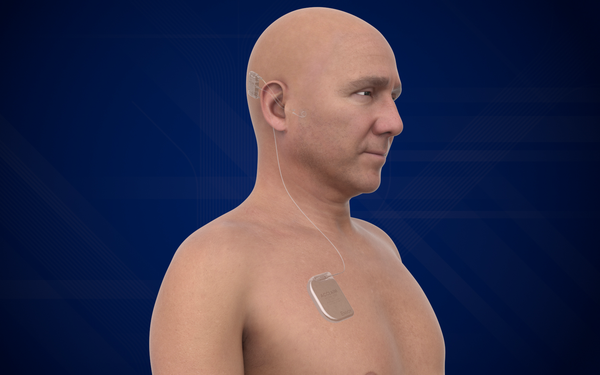
Envoy Medical, whose business is hearing implant
devices, boasts a two-tiered path to future growth.
One involves Esteem, the only FDA-approved fully implanted hearing device of any kind.
Around since 2010, Esteem goes into the
middle ear for people with moderate to severe hearing loss, a market which probably numbers 40 million people in the U.S., with 10 to 14 million of them likely candidates for the device, Envoy chief
executive officer Brent Lucas tells Pharma & Health Insider.
Yet only a thousand people or so have opted to receive the implants so far. You can blame that on the whopping price of
$25,000 to $30,000 for the device and associated surgery.
And you can blame the cost on lack of Medicare coverage.
The law prohibits Medicare from covering hearing aids, and the Center
for Medicare Services (CMS) has classified middle ear implants as hearing aids, despite the Food and Drug Administration labelling them as prosthetics.
advertisement
advertisement
To solve a regulatory discrepancy like
that, you apparently need a new law. And so Envoy, forced by the lack of Medicare coverage to put Esteem on the back burner over the past decade, is pinning the product’s resurrection on passage
of the Hearing Device Coverage Clarification Act, an aptly named bipartisan bill now before Congress.
Lucas, who joined Envoy in 2015, terms the company, which launched 20 years earlier,
“a classic example of what can happen to a startup company with a very interesting technology if it is not covered by insurance right away.” While “getting FDA approval is a big
deal,” he explains, “insurance reimbursement is incredibly important for a medical device company.” So he also supports legislation that would mandate FDA-approved breakthrough
medical devices to be “covered automatically for the first few years.”
Without such an advantage in Envoy’s past, Lucas notes, “I often call us a 30-year-old
startup.”
That’s a good segue into Envoy’s second product, called Acclaim. Now in trial phase with possible launch by early 2027, Acclaim would join other implanted cochlear
devices in the market for people with severed to profound hearing loss, but with one major exception: like Esteem and unlike cochlear competitors, Acclaim does not use microphones to pick up sound,
but rather the human ear itself.
The reason why the cochlear market is crowded while the middle ear market is lonely may be traced back to Medicare rules once again. Seems that CMS, not
Congress, gave cochlear devices an exemption from Medicare’s hearing aid exclusion.
Lucas says some 3 million to 4 million Americans are candidates for cochlear implants, which have been
around for 30 years, with some 150,000 people getting them.
Part of the reason for the low takeup, he says, could be attributed to established cochlear implants being bulky and
“externally visible.”
“A traditional cochlear implant needs both the external and the internal component to work together,” Lucas explains. “Our device does not
have an external. Discreetness is a huge benefit, and we think that' s going to be a primary reason why people adopt this technology."
He adds, "You never have to take your device off or turn
it off if you don't want to.”
If all goes per plan, Envoy expects to rely on a couple of otologist/neurotologist-staffed hearing centers in each state to perform the surgeries or both
Esteem and Acclaim patients, Lucas says.
For consumer outreach, he’s a big fan of earned media coverage, along with seminars and educational events “where we can have a very
targeted audience that would have a high hit rate.” Some direct -to -consumer advertising would also be in the mix, but “we learned a lot of lessons from our initial experience with Esteem
that direct -to -consumer marketing is incredibly expensive and has a very low hit rate for something like this.”
The hearing implant market is also being helped, at least indirectly, by
the recent expansion of hearing aids into the over-the-counter market.
“More people are now coming into the overall funnel because they are becoming aware of hearing loss overall,” Lucas notes. “It's going to increase the size of this market as more
and more people realize how badly hearing loss can affect your health. As their hearing loss progresses, they may need a prescription hearing aid --or they may need an implant
He adds,
“Frankly, I'm glad we're not a hearing aid company because I don't want to be competing with the likes of Sony, Bose, Apple and Samsung."